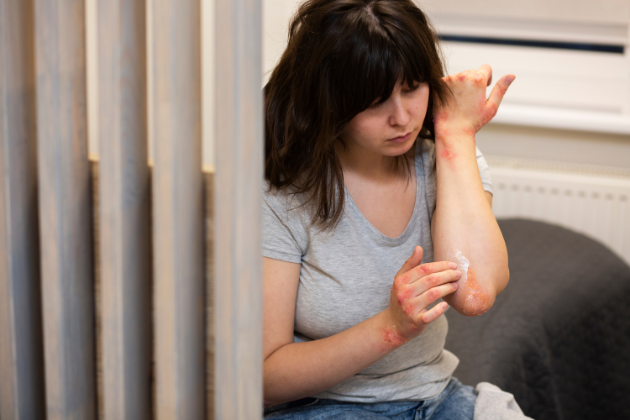
The potentially fatal bacterial infection tetanus, commonly referred to as "lockjaw," damages the nervous system and causes excruciating spasms in the muscles. Tetanus is a severe health concern worldwide, even though it is not a frequent infection in wealthy countries because of extensive vaccination. It is essential to comprehend the causes, signs and symptoms of tetanus in order to prevent and detect the disease in its early stages.
Clostridium tetani is the bacteria that causes tetanus. Common sources of these bacteria include dust, soil and animal dung. Even small wounds like cuts, scratches or burns allow them entry into the body through skin breaks. When the bacteria get inside, they release a potent toxin that damages the neurological system and causes stiffness in the muscles, excruciating spasms and hard swallowing.
Stressful spasms and rigid muscles are brought on by tetanus, which damages the neurological system. The most noticeable sign is having trouble opening the mouth, which is why it's called "lockjaw." After being exposed to the germs, tetanus symptoms usually appear 7 to 10 days later, however they can often take weeks.
Even though the first symptoms might not be noticeable, they develop quickly. The standard progression is broken down as follows:
The Clostridium tetani bacteria is the cause of tetanus. Because they produce spores, these bacteria are able to endure long periods of time under unfavourable conditions. Animal dung, dust and dirt are frequently contaminated with C. tetani spores.
Tetanus causes infection when the spores enter the body through a wound, even a minor puncture or cut. Once inside, the spores have the ability to germinate and become active bacteria that release tetanospasmin, a potent neurotoxin. The distinctive muscle rigidity and spasms associated with tetanus are brought on by this toxin, which enters the neurological system.
A person who has not received a tetanus vaccination runs the danger of getting sick. But some things make you more likely to get hurt:
The best defence against infection is a tetanus immunisation. As immunity deteriorates with age, booster shots are crucial.
Tetanus bacteria may develop and create toxins in an environment that is conducive to their growth in deep, pierced wounds with little oxygen exposure.
One can come into contact with the germs by walking on a rusty nail or by puncturing wounds from other contaminated materials.
Spores can enter the body when medications or other substances are injected using non-sterile needles.
Individuals with compromised immune systems or long-term medical issues may be at a higher risk of contracting tetanus.
The most efficient method of preventing tetanus is vaccination. Usually, the tetanus shot is given as a part of a combination vaccination (DTaP or Tdap) that also guards against whooping cough and diphtheria.
Both adults and children should adhere to the advised vaccination schedule in order to preserve immunity.
Starting at two months old, children get a series of tetanus vaccinations. Boosters are given at four months, six months, fifteen to eighteen months and four to six years old.
In order to preserve immunity, adults require tetanus boosters every ten years.
Tetanus cannot be cured, although recovery rates can be greatly increased with prompt treatment. Treatment targets include:
To get rid of any last germs or spores, clean and debride the wound.
To counteract the circulating tetanospasmin and stop more muscular spasms, an antitoxin is given.
Patients might need to take painkillers, nutritional supplements and respiratory support.
To keep your immunity intact for the rest of your life, make sure you get the appropriate booster injections.
The main uses of Vatchintamani Ras (Swarn Rahit), an Ayurvedic formulation from Jamna Herbal, are to treat Pittaj illnesses, convulsions, vertigo, sleeplessness, delusions and tetanus. It is also used to strengthen the body. Let's examine each component and how it might help treat tetanus:
These components have a reputation for being nerve-calming and antispasmodic. These components can aid in lessening the severity of spasms and encouraging relaxation in tetanus patients, who frequently experience stiffness and spasms of the muscles.
Minerals including calcium, magnesium and iron are abundant in these substances. They can aid in enhancing the body's general vigour and strength, which is important during tetanus recovery.
For haemoglobin, the protein that carries oxygen in the blood, to develop, iron is necessary. Lauha Bhasma may assist in enhancing oxygenation and general respiratory function in cases of tetanus, where respiratory difficulties may arise from rigidity of the muscles.
This component, which combines sulphur and mercury, is employed in Ayurveda for its antispasmodic and neuroprotective qualities. It might lessen the intensity of tetanus-related muscular spasms and convulsions.
Aloe Vera is well renowned for its anti-inflammatory and calming qualities. It could be advantageous for tetanus therapy as it may aid in lowering inflammation and accelerating recovery.
In general, these components are used in Vatchintamani Ras (Swarn Rahit) to offer a comprehensive method of treating tetanus. It seeks to enhance general vitality, ease muscle tension, enhance nerve function and assist the body's inherent healing mechanisms.
To guarantee correct dosage and safety, you must use this medication under the supervision of a licenced Ayurvedic practitioner. This is especially important because some of the constituents include heavy metals like mercury.
Tetanus is a dangerous disease that can be avoided with vaccination and good wound care. You can greatly lower your chance of developing this crippling condition by maintaining current vaccination records and practising appropriate wound care. If you develop any tetanus-like symptoms, get medical attention immediately. A good recovery depends on early diagnosis and treatment.